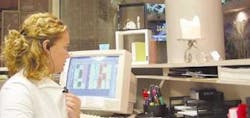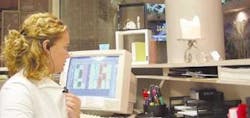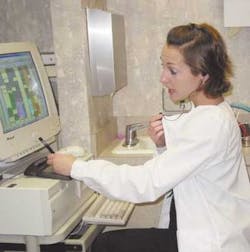The no-huddle offense
Can headsets really replace the morning huddle? One Texas office says, "You bet!"
By Kent Smith, DDS
It's the last few minutes of the football game, and time is the enemy. As the quarterback, you must elevate your level of play as you move with precision in a time-efficient manner toward the goal line. Most plays are run on instinct, and there is no help from the sideline. With no huddle, you get no responsive claps, smiles of agreement, or rejoinders from a wide receiver overlooked. The game is on, the goal is reachable, and instinct reigns. This is the no-huddle offense.
The no-huddle offense has been a staple of professional football for many years. It's a beautiful thing to watch when 11 players march down the field as one well-oiled machine. Everyone knows his job and he knows where the goal is. So why doesn't everyone use this approach the entire game? Well, I have this television network theory. ABC had problems with games that ran so long and cut into ... well, never mind. Anyway, this would be impossible without intense planning, a competent team, and many hours spent tuning the fine points.
Are you playing a football game in your office? If you are following the advice of most (or should I say all) practice-management specialists, you have probably become trapped in what I lovingly call "huddle hell." Now let me say that there are some offices that huddle so efficiently that it's the unabashed catalyst for a smooth, spirit-filled, and productive day. I can see them now, giving each other high-fives as they circle the table singing the office fight song. That did not describe our huddles. In fact, we tried for more than 10 years to make huddles the nurturing environment we heard so much about.
null
For those who have seen Steve Rasner's video of the "before and after" huddles in his office, he does a masterful job of recreating the "before" version. He purposely exaggerates both ends of the spectrum, but his audiences laugh louder at the "before" because they can relate so well. He has team members filing their nails, reading magazines, and showing no energy whatsoever. Like Steve, I found myself dreading the morning huddles — and my money says some of you dread them as well. As a New Year's resolution going into 2002, I sent out a memo. I had heard my last recount of LeAnn's love life (name changed to protect the author). Morning huddles were getting the proverbial axe.
Management experts may need to check their blood pressure at this time. In fact, my partner, Jeff Roy (name unchanged to wound the guilty) was at a meeting recently where the speaker announced: "Raise your hand if you hold a morning huddle." It was quite obvious that he was alone in the no-huddle group and, as Jeff withered in his seat, he remembered those days growing up in a Baptist church when the preacher asked anyone not saved to raise his or her hand. Something tells me this speaker can preach.
Now, you may have been contemplating this for years, but knew there was simply too much valuable insight being shared at the meetings to give them their pink slip. After all, how could we function without knowing the average production for the month? What about that patient with the recent divorce we don't want to offend? How would anyone know who was going out for lunch that day? I would advise you to step back and take a look at what is accomplished in your morning meetings. How much worthless information and carping is dispensed, and how much helpful data do you really take from each meeting?
Here is a helpful exercise. Total the useful dialogue, and decide how many minutes it took to provide that. Now, how much total time was dedicated to the meeting? This would include waiting on someone to come out of the bathroom, phone interruptions from a family member, and waiting on Sharon to finish chewing her bagel so she can comment on why Mrs. Baker cancelled (as if it even matters to the collective team). My guess is that only a fraction of your meetings are useful to the entire team.
null
So, how would you handle the loss of that fragment of corporate bonding obtained from time to time in those huddles? Let me tell you what we have done.
Toward the end of 2001, we happened upon a new form of interoffice communication, and we have never looked back. It's a radio system that uses an earpiece, and a microphone that resides near the mouth. After experimentation with a few systems, including some headset trials that included some Janet Jackson-style mouthpieces, we settled on a Radio Shack brand, primarily because they worked with a headset that employs an over-the-ear loop and a "talk" button along the cord. Your local Circuit City, Radio Shack, or other retail store that carries communication gear will most likely give you a 30-day guarantee, and I would make sure you get this in case your reception is undesirable with the unit you have.
Not only did this allow us to disseminate the small amount of useful information we were missing from our lost huddles, but the added benefits we have found with this system are many, and we continue to add to them as we discover more uses. Patients are generally impressed with the technology, especially when they see the benefit to themselves. "Dovie, we are trying to decide whether or not to start a bridge this month. Can you check on Mrs. Sturgeon's remaining benefits for this year?"
Team members are easily found — "Kristen? Are you in the bathroom?" Hygienists can be warned when a patient is running 10 minutes late — "Holly, what would you like us to tell Kelly when she waltzes in showing no remorse?" Missing items are quickly located — "Michelle, have you seen Mrs. Horn's denture?" Warnings can be issued — "Dr. Smith, don't wander up front. That sales rep is here again." Sudden meetings can be called at day's end before anyone can sneak out — "We need to implement a more efficient system for tracking dentures after we clean them."
A collateral benefit was immediately apparent after strapping on the gear. Not only did I now get to hear the tremendous amount of teamwork that exists in our office, ("Can someone bring me some emesis powder?" "I'll be right there, Crystal!"), but I suspect the concept of teamwork got a shot of epinephrine. If you knew everyone could hear you, would you not be more willing to offer assistance to a team member?
We still have monthly team meetings. With computers in each operatory, we use WinPopup for lunch plans, important patient updates, and other peripheral issues. We use e-mail in many ways, and we post the important practice "numbers" on the board in the staff lounge, but our primary mode of communication is now sent via airwaves. After more than a year using this radical mode of communication, I have come up with many items to note in their daily use, and I may list those in a later column if there is interest.
We have limited minutes in the workday, and you might be surprised at how productive your team can be during the time you were using for your morning huddles. If you try this, I would advise you to keep the same patient hours, require the same arrival time from your staff, and allow each team member that extra time to deal with issues that will directly affect them during the course of the day.
Are you an effective coach who can let go of some control and trust your team to work toward a common goal (line)? Is your team intelligent enough to run your office on instinct, or do they still require daily checkups? I do not pretend to know your office, nor do I believe every concept works in every office, so if your morning huddles are exceedingly helpful and emit a pleasant aroma, I would expect you to keep it up. However, if you are in the other camp, you might at least consider offing your huddles, and going with a "no-huddle offense." You might be surprised at how efficient you can be.
Dr. Kent Smith graduated from Baylor College of Dentistry in 1985, and in 1991, started what is now 21st Century Dental, which has been featured in various publications, on the local ABC affiliate several times, and on "The Early Show" with Bryant Gumbel for his use of technology and spa dentistry. He may be reached from his Web site at www.21stCenturyDental.com or via e-mail at [email protected].


